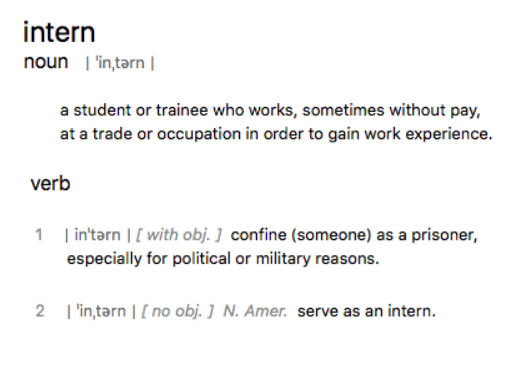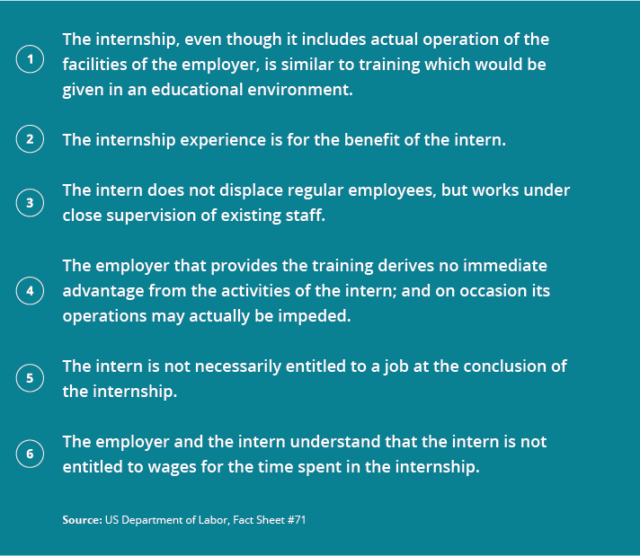The false economy of unpaid internships

The word ‘intern’ has an ironic double meaning: to work as a trainee and to confine someone as a prisoner. Most articles about unpaid internships explore this irony from the intern’s perspective. They’re often just glorified coffee gofers who don’t earn or learn anything. Or they’re de-facto full-time workers who hope unpaid work will be their gateway to paid jobs. There’s no denying how confining unpaid internships can be, from an intern’s point of view. But unpaid internships confine companies too, because they sacrifice long-term development for short-term gain.

Unpaid internships are an example of what economists call a ‘false economy.’ They seem to save money at first. But over time, they waste more money than they save.
Free workers (like proverbial free lunches) come at a price. The price of unpaid internships is often too high for companies to pay. They can devalue work, breed monoculture workers and undermine companies’ employer brands. They’re not a good recruiting or business strategy.
Unpaid internships can devalue work (and not just for interns):
Colleges and qualification boards around the world often require students to do unpaid ‘work experience’ as part of their training. For example, Europe’s Bologna Process includes some degrees that require unpaid work experience. Many US colleges offer college credit for unpaid internships too. These kinds of college-vetted internships are primarily designed to educate interns, not to benefit companies. But often, the dividing line between education and exploitation is hard to define. It gets even hazier when interns work for profit-driven companies. The US Department of Labor lists six guidelines that profit-driven companies need to follow. If they don’t, their unpaid internships are illegal:

In reality, most unpaid internships violate these guidelines. Most obviously, #4: the idea that interns’ unpaid work shouldn’t advantage companies. This guideline may seem ridiculous (and US-specific). But it’s founded on a basic rule of business ethics:
Companies should pay for services they find valuable.
In every capitalist country in the world, companies are profit-driven enterprises. If they profit from work, they should pay for that work. Companies aren’t charities or branches of government, they’re businesses – and as such, they should play by business rules. For companies, value is money. If a company doesn’t think work is worth paying for, it’s not actually valuable to them and they shouldn’t be asking anyone to do it. And no well-managed company is going to engage an intern without getting some value out of them. So:
- If an intern’s work is valuable, companies should pay them.
- And if an intern’s work isn’t valuable, companies shouldn’t engage them.
By refusing to pay for valuable work, companies don’t just muddy their business ethics and devalue their interns. They devalue their full-time employees too. Hosting unpaid interns sends the message that some kinds of work, and some kinds of workers, are worthless. This is a terrible message. It demeans the work of employees who manage and offload tasks to interns. And it undermines the idea that work has inherent dignity.
Unpaid internships can grow a monoculture crop of colleagues:
Being an unpaid intern is often a mark of luxury. Only the offspring of the wealthy can afford to spend time on unpaid economic pursuits. Some coveted internships are even auctioned off to doting parents who bid ridiculous sums. If companies use their unpaid internships as recruiting vehicles, they’re only offering opportunities to a narrow socioeconomic group. Most companies are conscious of the ‘glass ceiling’ problem, where women can’t advance past a certain salary or responsibility level. Unpaid internships create a similar issue at the ground level by laying a ‘glass floor’ that entry level workers from certain socioeconomic backgrounds find difficult to shatter.
There’s a well documented business case for diversity. Diverse teams make better decisions, build better products and drive higher, more sustainable profits. But often, businesses only combat diversity based on race, gender and differences of sexuality. Not socioeconomic differences. Granted, socioeconomic divides are often correlated with race, gender and sexuality. But they’re not the same. To build a truly diverse team, companies should think beyond unpaid internships. They’re not doing their long-term diversity or recruiting efforts any favors.
Unpaid internships can hurt employer brands
Companies spend a lot of time and money building their ‘employer brands.’ Companies that offer unpaid internships can undermine their employer brands and damage their reputations. Not because of lawsuits filed by unpaid interns suing for back pay. (These kinds of lawsuits have been publicized a lot. But they’re only newsworthy because they’re rare.) Instead, companies that host unpaid interns undermine their employer brand efforts by being inconsistent employers.
Unpaid interns aren’t employees – they’re just legally-grey-people wandering around company offices. Their work isn’t taken seriously, they’re not invested in and they rarely enjoy employee rights. But they have access to company buildings and IT networks. An employer who allows non-employees that kind of access isn’t really an employer at all. They’re a muddled mix of employer and volunteer agency. To be a good employer, you should actually employ all of your workers.
A couple of years ago, the United Nations had an awkward PR incident. One of their interns was found camping out in a tent near their headquarters in Geneva. Geneva is one of the most expensive cities in the world and the intern in question argued that he couldn’t afford rent on his non-existent salary. Hence, his tent. This incident was particularly embarrassing for the UN because they’re in the international human rights business. The UN Declaration of Human Rights lists some employment rights, including this one:
“Everyone who works has the right to just and favorable remuneration.” – Article 23 (3)
The UN said they would love to pay their interns, but states that they can’t, for bureaucratic reasons. Similar excuses and employer brand inconsistencies aren’t acceptable for well-managed companies. If companies pay their interns, they’ll show that they value their workers, they’ll improve their workplace diversity and they’ll build consistent employer brands. They’ll also enjoy the added bonus of earning the right to feel morally superior to the UN.




